“I was really struck by what a difference it made for her to sit down and just be listened to,” said Pitcan. “That got me interested in the power of having somebody to witness what you’re going through—and how that can give people hope.”
Pitcan is a 27-year-old doctoral candidate in counseling psychology at the Graduate School of Education who will graduate this May. Over the past decade, she studied psychology as an undergrad at the University of Florida and completed a master’s degree in mental health counseling at GSE. She also volunteered as a 24-hour crisis/suicide hotline operator and counseled people of varying ages at several psychology internships.
Exploring Racial Microaggressions Against Black Men
More recently, she is the mastermind behind a project published by the American Counseling Association—one of the world’s largest organizations dedicated to professional counselors.
Last December, Pitcan published one of her GSE research projects in The Career Development Quarterly, a research journal put out by the American Counseling Association. Her project, “Black Men and Racial Microaggressions at Work,” focused on the comments and behaviors that subtly—and often unintentionally—express discrimination toward marginalized groups. She analyzed the experiences of 12 black men employed in companies where the majority of the employees were white. Over a span of two years, she spoke with them about the microaggressions they had faced in the workplace. Then she asked them about how they had reacted: what they felt, what they thought, and how they coped.
“It made them feel really alienated at work,” Pitcan recalled. “It left a bad taste in people’s mouths.” But because the nature of many reported microaggressions was “ambiguous,” a lot of people were uncertain about how to address them.
The motivation behind Pitcan’s project was her own experiences as a Jamaican-American. She recalled attending majority-white schools where students made “weird” comments that were supposed to be compliments, but came across as insults. “You don’t talk like a black person” was one of them.
“It’s a symptom of a larger problem,” Pitcan said, referring to racial slights and wider discrimination across the U.S. “It’s like the fever you experience when you have an infection.”
Treating Trauma at a National Military Medical Center
Now Pitcan is a full-time clinical psychology doctoral intern at the Walter Reed National Military Medical Center—one of the biggest military hospitals in the United States.
Since last September, she has cared for U.S. military service members, retired military, and their families. Many of these patients deal with trauma related to combat, exposure to violence and death, sexual abuse, or childhood issues, she said. Some come in for couples counseling. Others grapple with more corporeal diseases like cancer.
Pitcan’s longtime GSE professor and research mentor, Jennie Park-Taylor, Ph.D., said that in the five years she’s known Pitcan, Park-Taylor has seen her consistently present her work at regional conferences with a “calm, cool, and collected” composure. She’s watched her connect with curious strangers in a “real” way, and break down complex topics into conversational language. And she’s reviewed hours’ worth of transcripts from Pitcan’s interviews with black men who’ve faced discrimination.
“All of her participants shared really personal and, I would say, painful experiences … She was able to create a safe environment for them to share that. To not make them feel any shame or judgment,” Park-Taylor said. “She was able to, I think, really probe in a deep way. And that’s really difficult sometimes with complete strangers.”
Pitcan’s internship at the Walter Reed National Military Medical Center also required her to commission in the U.S. Navy and become a lieutenant. Before she started working in clinical care, she underwent five weeks of boot camp in Newport, Rhode Island.
It wasn’t easy. But at the end of the day, she said, it was all worth it to help her patients rebuild their lives.
“Whatever your political beliefs are or however you feel about everything else, the individuals who serve in the military are sacrificing a lot for what they believe in,” said Pitcan, whose ultimate goal is to become a psychologist and establish a multidisciplinary group practice—a holistic group of doctors that includes experts in psychology, primary care physicians, mindfulness practitioners, and nutritionists.
“It’s really rewarding to get to work with folks who are willing to do that kind of work.”

